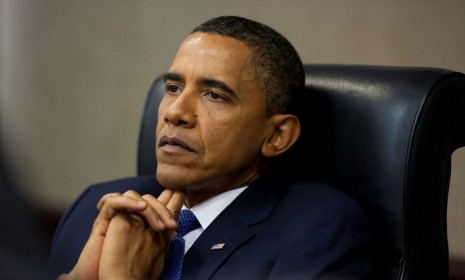The president and the race card
Racism has always been a part of politics, says Christopher Hitchens in Slate, but it is more common now that politicians have figured out how to be subtle about it

A free daily email with the biggest news stories of the day – and the best features from TheWeek.com
You are now subscribed
Your newsletter sign-up was successful
The "race-card game" has evolved over the last few decades, says Christopher Hitchens at Slate. When the 1960s started, "it used to be George Wallace and Orval Faubus" using the N-word. As the civil rights era advanced, this "became less respectable and, with the defection of white Southerners to the Republican Party," racial politics morphed into "more a matter of codes and signals": Richard Nixon's "Southern strategy" being a "subtle" example of this, while George Bush Sr.'s Willie Horton ad was "a rather crude one." But now that the U.S. actually has a black president, "the vagaries of the race card have, if anything, only increased." Here, an excerpt:
Long before Glenn Beck had accused the president of being motivated by hatred for white people, the Hillary camp had been circulating the rumor that Michelle Obama was on tape with a speech denouncing "whitey." ... [But] aside from a minor and avoidable gaffe on the occasion when Professor Henry Louis Gates Jr. was clumsily arrested at his own front door in Cambridge, Mass., Obama has done little or nothing to raise the racial temperature and has endured a pelting of vulgar defamation with remarkable patience.
It would be or ought to be dangerous if we ever get to the point where the charge of racism becomes so overused and hackneyed as to be meaningless. Such a term ought to retain its potency as a weapon of shame and disapproval. Yet there are times, I must confess, that I almost wouldn't miss it.
The Week
Escape your echo chamber. Get the facts behind the news, plus analysis from multiple perspectives.

Sign up for The Week's Free Newsletters
From our morning news briefing to a weekly Good News Newsletter, get the best of The Week delivered directly to your inbox.
From our morning news briefing to a weekly Good News Newsletter, get the best of The Week delivered directly to your inbox.
Read the full article at Slate.
A free daily email with the biggest news stories of the day – and the best features from TheWeek.com
-
 6 exquisite homes with vast acreage
6 exquisite homes with vast acreageFeature Featuring an off-the-grid contemporary home in New Mexico and lakefront farmhouse in Massachusetts
-
 Film reviews: ‘Wuthering Heights,’ ‘Good Luck, Have Fun, Don’t Die,’ and ‘Sirat’
Film reviews: ‘Wuthering Heights,’ ‘Good Luck, Have Fun, Don’t Die,’ and ‘Sirat’Feature An inconvenient love torments a would-be couple, a gonzo time traveler seeks to save humanity from AI, and a father’s desperate search goes deeply sideways
-
 Political cartoons for February 16
Political cartoons for February 16Cartoons Monday’s political cartoons include President's Day, a valentine from the Epstein files, and more